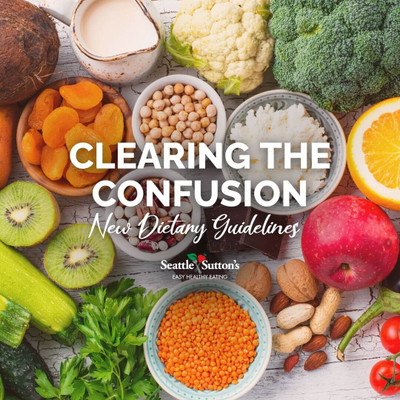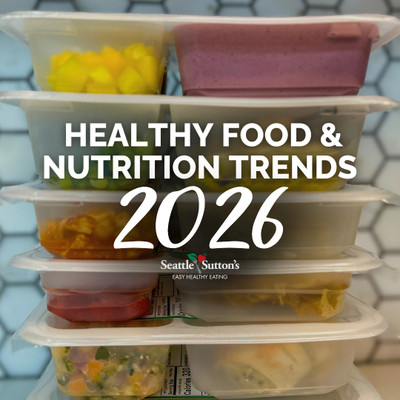Uncovering the Truth of Plant-Based Diets
"Eat more plants" has been common nutrition advice for many years but the plant-based movement is fairly new. A plant-based diet is becoming increasingly popular as it has many benefits for overall health but also ethically and environmentally.
A plant-based diet is a broad term which mainly refers to an eating plan that is low in fat, high in fiber, and focuses mainly on plant foods. This type of eating emphasizes fruits, vegetables, whole grains, legumes, nuts, and seeds.
The Mediterranean diet, often ranked the number one diet, is centered around plant-based foods. Research on the Mediterranean diet strongly reveals this eating pattern offers a host of health benefits and may help with weight loss, heart and brain health, disease prevention and control, and prevention of some types of cancer.
As more and more people are adopting plant-based eating, several myths exist that may discourage individuals from this healthful eating pattern or cause confusion of what a plant-based diet is. Let’s address some of the most common myths:
Plant-Based Diets Are Only for Vegans and Vegetarians
Many people believe that plant-based diets are the same as a vegan or vegetarian diet. However, the American Heart Association highlights plant based as a style of cooking and eating, which emphasizes plant foods but is not strictly limited to them. They recommend eating less meat overall, however, do not say you need to completely avoid it. The AHA suggests that meat may be included in the diet, due to its excellent source of iron, zinc, and vitamin B12, but not as the main feature of the meal.
It is also not true that you will not reap any benefits from a plant-based diet if you aren’t fully giving up animal products. Flexitarian diets, which are a plant-forward way of eating that incorporates some animal products, have been shown to have positive outcomes on weight management and heart disease risk.
The key to plant-based eating is to shift your plate towards fruits, vegetables, whole grains, beans, and nut/seeds to be the main stars and animal foods to be the extras. A good goal is to focus on plating two-thirds of your meals with plant-based foods and the remaining third to house animal-based foods.
Going Plant-Based Means Low Protein
One of the most common myths about plant-forward eating is that it does not have adequate amounts of protein. Many plant-based protein sources including lentils, beans, quinoa, nuts, tofu, and tempeh, are great sources of protein. A 1-cup serving of lentils has 18 grams of protein and a serving of quinoa provides 8 grams. With a balanced, varied diet getting adequate protein on a plant-based diet is not a concern.
Plant-based proteins also include all the essential amino acids needed for a balanced diet and are lower in saturated fat and high in fiber compared to meat.
At Seattle Sutton’s Healthy Eating you can add over 80 grams of protein to your diet, without the inclusion of meat or seafood, by eating 3 of our plant-based vegetarian meals per day.
You’ll Go Broke Eating Plant-Based
Another myth is that plant-based diets are expensive. While some specialty products are pricey, eating fewer animal foods can be very affordable. Foods like oats, rice beans, frozen and in-season fruits and vegetables can be very affordable and oftentimes cheaper than certain cuts of meat and processed foods.
Beans are one of the most affordable foods at the grocery store and often provides numerous servings that could be used in a number of meals. Beans are full of fiber, protein, and nutrients. A canister of oats is another plant-based food which is very affordable and nutritious. Oats add a hefty dose of soluble fiber to your diet which research has shown naturally lowers your LDL (bad) cholesterol. Peanut butter is another plant-based food that is easy on the budget. Nuts provide heart healthy unsaturated fats, vitamin E, zinc, and protein.
Planting a garden, buying in bulk, and shopping in season are all things you can do to help save money on plant-based foods and increase the variety in your diet.
If I Buy Something Plant-Based It is Healthy
Just because a food is labeled “plant-based” does not automatically make it a health food. Donuts, sugary sodas, French fries, and potato chips are all plant-based foods, and we all know they are not health foods. It is possible to be a “junk food” vegetarian. Eating a diet with many refined carbohydrates, added sugars, and unhealthy fats is not what we are recommending with a healthy plant-based diet.
The goal of a plant-forward eating style is to incorporate more whole foods. Foods that are ultra-processed often have been depleted of their nutrients and these are more likely to increase blood sugar and increase the risk for overeating.
Research has compared individuals following a healthy plant-based diet to those following an unhealthy (“junk food”) plant-based diet and found those with a more unhealthful eating pattern containing juices, refined grains, fried foods, and sugar-sweetened beverages had a substantially higher risk for heart disease. Additionally, a study from Harvard T.H. Chan School of Health and Brigham and Women’s Hospital found that an unhealthy plant-based diet led to a higher risk for cardiovascular disease than diets that were higher in healthy plant-based and animal foods.
Plant-Based Diets are Nutritionally Inadequate
If planned and executed right, a plant-based diet can provide all the nutrients the body needs to be healthy. Incorporating variety, balance, and nutrient-dense foods helps ensure you are getting the right amounts of vitamins, minerals, protein, fiber, and healthy fats.
Getting adequate iron is often a concern for people considering going plant based. Remember, plant-based can still include some animal products which are great sources of iron, but iron is also abundant in plant foods like spinach, lentils, tofu, chickpeas, and quinoa.
While it is true that heme iron from animal products is absorbed better than the non-heme iron is plants, when combined with vitamin C-rich foods it enhances absorption. Pair your plant-based foods with citrus, bell peppers, or broccoli and you will absorb more iron.
Plant-Based is Too High in Carbohydrates
Beans, grains, starchy vegetables, and fruits contain carbohydrates and when replacing some animal foods with some plant-based foods you may be adding additional carbohydrates to your diet. Some individuals worry that increasing their intake of plant-based foods might lead to higher blood sugar levels. The fact is that there are different types of carbohydrates and the unrefined, whole sources of carbohydrates, like those mentioned above, take longer to digest, and release sugar slowly into the bloodstream and can improve blood glucose control.
The higher fiber content in a plant-based diet makes it easier to feel fuller on fewer calories which may help with weight loss. Research has shown that eating more plant foods can also help to prevent dangerous complications of diabetes such as heart disease.
Non-starchy vegetables, nuts/seeds, and tofu are great low carbohydrate plant-based foods to load up on a diabetic diet. If you are incorporating plenty of these foods and if desired some animal-based foods, you will notice many benefits with your blood sugar and overall health.
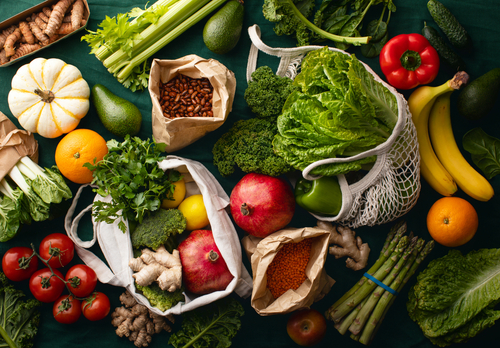
I Can’t Go Plant-Based with Kidney Disease
Diet education for kidney disease often focuses on avoiding certain foods and patients are given long lists of foods to not eat, which generally includes very healthy foods like fruits and vegetables. However, newer guidelines have recommended focusing on total diet quality and more plant foods.
A diet aligning with the Mediterranean or DASH diet has been encouraged for better kidney health. Newer studies have found that following a plant-based diet was connected to improved kidney health, lower rates of CKD, and those with CKD who adopted these eating practices slowed their disease progression. A diet rich in plant foods can slow kidney disease, improve blood pressure and diabetes management.
It is important for individuals with kidney disease to talk to their doctor or dietitian about their specific nutritional needs and to develop a plan for them based on their lab values and overall medical conditions.
With the recent surge in plant-based diet it is important for people to know the facts when it comes to this eating pattern. A well-planned diet filled with a variety of colorful whole foods can provide delicious meals that offer the body many health benefits. Whether you are flexitarian, vegetarian, vegan, or simply trying to add more plant-based foods to your diet you can find a plan that works for your goals and preferences.
Each one of the plans offered at Seattle Sutton’s Healthy Eating would be considered plant based as each plan is centered around fruits, vegetables, whole grains, and healthy fats. You will also find a variety of vegetarian meals on each of our plans. Check them out today!





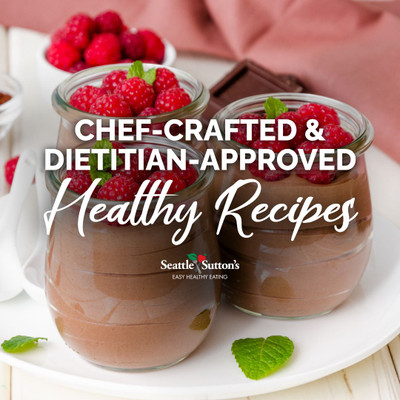

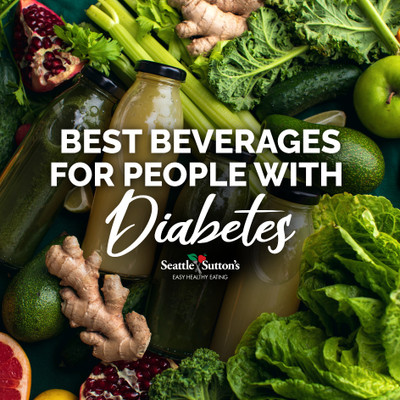

 Weight Loss
Weight Loss Health & Wellness
Health & Wellness Diabetes
Diabetes Heart Health
Heart Health Motherhood & Family
Motherhood & Family Dietary Restriction
Dietary Restriction Other Health Conditions
Other Health Conditions About SSHE
About SSHE